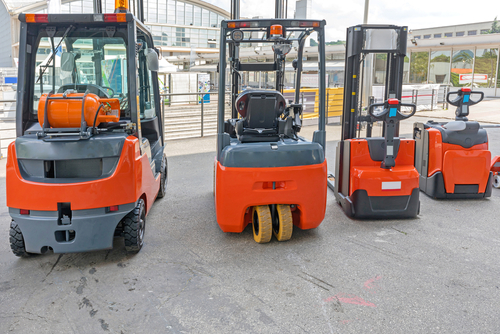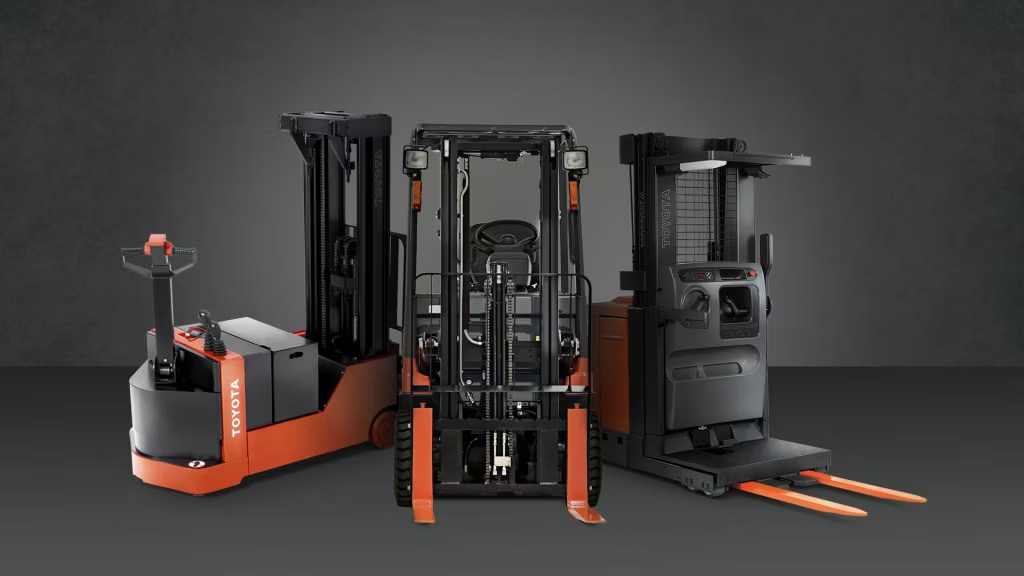
If you’ve ever been tasked with choosing a forklift for your business, you know it’s not as simple as it sounds. One of my long-time customers, Paul, a warehouse manager who’s been in the logistics business for over 20 years, once told me how overwhelmed he felt when he first had to decide between an electric, propane, or diesel forklift. Each seemed to have its pros and cons, and he wasn’t sure which would work best for his busy warehouse. Like Paul, many people find themselves asking: How do you choose the right type of forklift? The answer depends on your specific needs, environment, and long-term goals.
Paul’s first thought was to go with an electric forklift. After all, they’re becoming increasingly popular in warehouses and indoor operations, thanks to their quiet operation and zero emissions. Electric forklifts, such as those from Crown, Raymond, and Hyster, are known for their efficiency. They don’t need gas or diesel, which means lower operating costs over time and no need to worry about storing fuel on-site. Another customer of mine, Mary, swears by her fleet of Toyota electric forklifts. She runs a food distribution business and needs clean, emission-free machines to meet strict health and safety regulations.
Electric models are particularly well-suited for indoor use where ventilation might be a concern, or when a quiet operation is a priority. I remember one case where a distribution center switched from propane to electric forklifts to reduce noise levels. Their team was thrilled with the improvement in working conditions—they could finally hold conversations without shouting over engine noise. Plus, the switch helped cut down on their maintenance costs since electric forklifts have fewer moving parts and no need for regular oil changes.
However, electric forklifts aren’t perfect for everyone. If you need to run them 24/7, keep in mind that recharging batteries takes time, typically several hours. That’s where lithium-ion batteries can be a game changer, offering faster recharge times and the ability to be topped up during short breaks. But the upfront cost can be a hurdle, and for businesses operating outdoors or in harsh conditions, electric might not be the best fit. One customer found this out the hard way—he bought a few electric forklifts for an outdoor lumberyard, only to realize they struggled with the rough terrain and wet weather.
For businesses needing a bit more muscle, internal combustion forklifts powered by propane, gas, or diesel can often be a better fit. My client Paul eventually went with a propane forklift because he needed a machine that could handle both indoor and outdoor use. Propane forklifts, like the popular Yale and Hyster models, are versatile, with the added bonus of being relatively clean-burning compared to diesel. You can switch a propane tank in a matter of minutes, allowing for almost non-stop operation—no waiting around for batteries to charge.
Propane forklifts also have strong lifting capacities, making them suitable for heavy-duty tasks like moving large pallets of inventory or loading freight. But they’re not without their drawbacks. For one, the cost of propane can fluctuate, and if you’re using them indoors frequently, you’ll need good ventilation to avoid gas buildup. Paul’s team noticed that after long indoor shifts, the propane smell lingered a bit too much for their liking, so they started using them only when they really needed that extra power.
Then there’s gasoline and diesel forklifts. These are the true heavy lifters—machines built to handle the toughest jobs in construction sites, lumber yards, and large-scale manufacturing. Diesel forklifts from brands like Komatsu and CAT are known for their rugged durability and high torque, which is crucial when moving extremely heavy loads. I’ve seen some of these forklifts in action at a concrete plant, where electric and propane models just wouldn’t cut it. Diesel forklifts also excel in outdoor settings, handling rough terrain better than their counterparts. But they’re noisy, emit a fair amount of pollutants, and have higher long-term maintenance costs. For operations that value raw power over anything else, though, diesel can be the way to go.
When Paul was weighing his options, I told him the same thing I tell all my customers: think about the environment you’ll be operating in. Will the forklift spend most of its time indoors or outdoors? For Mary’s food distribution center, electric was the obvious choice. But for Paul’s warehouse, where he needed to go in and out of loading docks all day, propane made more sense. A colleague of mine, who manages a lumber yard, swears by his CAT diesel forklifts for their sheer power and ability to plow through rough terrain.
Your budget is another critical factor. Electric forklifts have a higher upfront cost, but their long-term savings on fuel and maintenance can balance out over time. Conversely, a propane forklift might be cheaper to buy, but the ongoing fuel costs can add up. When a local manufacturer was updating their fleet, they crunched the numbers and realized that, over ten years, their propane forklifts were costing them nearly 30% more in fuel and maintenance compared to a comparable electric fleet.
If your operation requires forklifts to work continuously with little downtime, internal combustion models—whether propane, gas, or diesel—tend to outperform electric ones in terms of endurance and flexibility. One logistics company I worked with recently decided on a mixed fleet: they use electric forklifts for their main warehouse, where emissions and noise are a concern, and diesel forklifts for their outdoor yard. It’s an approach that maximizes efficiency based on the unique demands of each environment.
Ultimately, choosing between electric, gas, and other types of forklifts is all about finding the balance between cost, performance, and operational needs. If you’re in a clean, indoor environment and want to reduce noise and emissions, electric forklifts are likely the best fit. But if you need versatility, propane might be the way to go, as it offers a good blend of indoor and outdoor capability. For heavy-duty, continuous outdoor use, gas and diesel are hard to beat.
Paul, after much deliberation, ended up purchasing a fleet of propane forklifts for their quick refueling and balanced indoor-outdoor performance. A year later, he’s still happy with his decision—his team has the power and flexibility they need, without the downtime that recharging electric models would have brought. His story is a testament to how taking the time to evaluate your specific needs can pay off in the long run.
So, when choosing a forklift, don’t rush the decision. Ask yourself: What will this forklift be used for? How often will it run? What’s the long-term cost? Whether you go for an electric, gas, or diesel machine, making the right choice will not only save you money but also keep your business running smoothly and efficiently for years to come.

December 18,2024


December 15,2024

December 15,2024

December 14,2024

The largest network of forklift dealers in the US and Canada is at your fingertips. Get the best pricing nationwide now on renting or buying a forklift
Get the lowest prices from our forklift dealers near you.